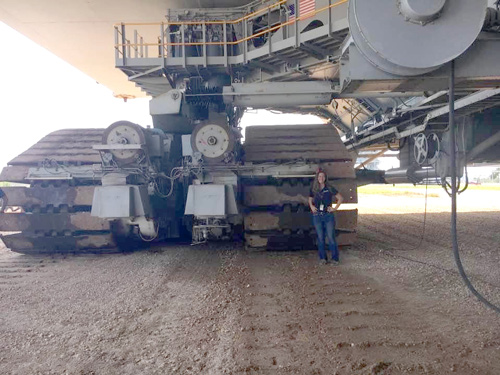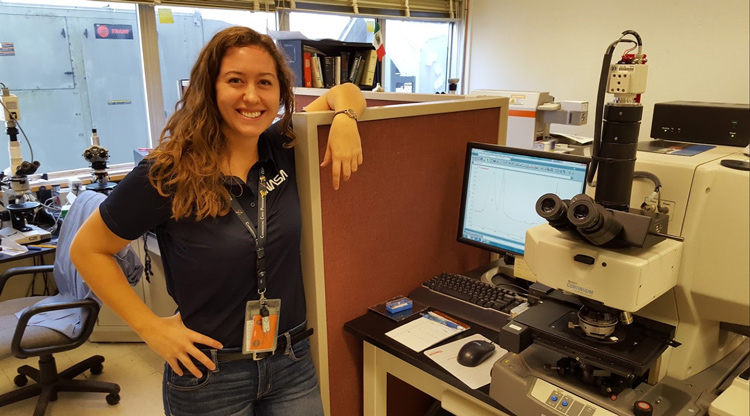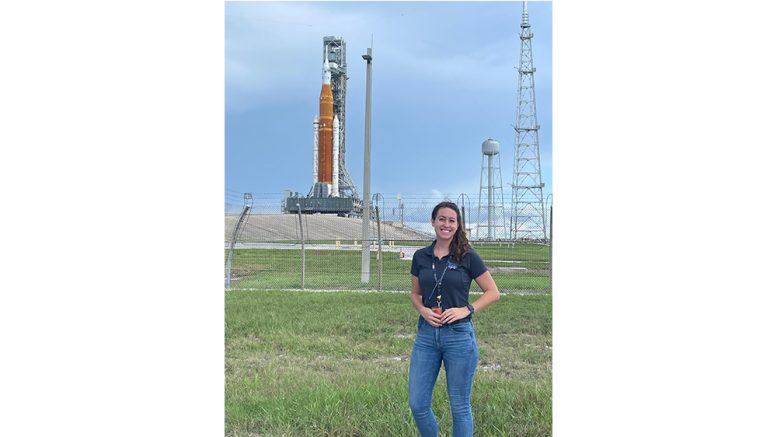Submitted
Space junkies across the nation are excited to see the U.S. space program going back to the moon.
When the Artemis I successfully splashed down on Sunday off the coast of Baja, Calif., it was 50 years to the day after the last Apollo moon mission touched down on the lunar surface. This is a major step for NASA, and it has an exciting local connection. When the Orion spacecraft launched earlier this fall headed to the moon, 2013 Sheridan graduate Macy Mullen was there. In fact, she contributed to the success of the launch.
NASA’s Orion spacecraft is built to take humans farther than they’ve ever gone before. Mullen explained that the overarching program is called the Artemis Program, which is NASA’s program to return astronauts to the moon for long-term durations and develop the technological capability to move onto Mars. The Artemis Program consists of two parts: the Orion Program which is building the Orion spacecraft and the Space Launch System (SLS).
“The Orion spacecraft is the crew module which sits atop the SLS rocket capable of exceeding low Earth orbit to reach the moon, currently the only of its kind,” Mullen said. “The recent successful Artemis I launch to the moon was the first test flight of the program, the next launch (Artemis II) will be a manned lunar fly-by mission.”
Mullen works in the NASA Investigative Chemistry Laboratory. She explained that when contaminants are discovered in or on the spacecraft or launch vehicle systems, propellants, or ground and launch support equipment such as the crawler transporter, mobile launch tower, or launch pad infrastructure, it is sent to their lab, and they analyze and identify it using various microscopy, spectroscopy, and chemical analysis techniques. She provided an example of her work:

Macy Mullen next to the Crawler-Transporter 2. (Photo provided)
“I recently examined the quick disconnect, liquid hydrogen seal responsible for the leak that scrubbed the second Artemis launch attempt,” Mullen said. “This provided the SLS team with information as to what caused the leak and for them to place preventative measures for the next launch attempt.”
Mullen majored in chemistry at Purdue University and after her sophomore year, she secured a temporary internship (OSSI) with the NASA Commercial Crew Program at Kennedy Space Center (KSC). She supported the Safety Technical Review Board responsible for certifying SpaceX and Boeing/ULA’s rockets for human-rated spaceflight. At the same time, her mentor at NASA allowed her to spend part of her time in the Applied Chemistry Laboratory working on an in-situ resource utilization project. There, she learned about a recurring internship (Pathways Program) with the NASA’s Analytical Chemistry Laboratory where she began working full-time after graduating.
Since going to NASA full-time, Mullen has accumulated a long list of awards from NASA, including On the Spot Award, Time Off Award, Engineering Excellence Award, Engineering Directorate’s Employee of the Month, and NASA Engineering & Safety Center Materials Technical Discipline.
During her time at Sheridan Schools, Mullen said there were many influential people. She specifically mentioned a few.
“Mrs. Jessup, with whom I’m still close, became a second mom to me during my time at SCS,” Mullen said. “She was one of my basketball coaches and biggest supporters who encouraged me to follow my dream. When rocket launches correlated with my study halls, she would let me watch them in her office.”
The admiration with Technology Director Lea Jessup is mutual. Jessup said of Mullen, “Macy is an amazing kid. She knew from third grade what she wanted to do and worked very hard her whole life to reach her goals.”
Mullen added that she had a great chemistry teacher in Mr. Terhune. She also mentioned Mrs. Anderson in the counseling department, as well as Mrs. Hogge, who taught a STEAM class, “was flexible and supportive to students’ interests. It was refreshing to have a teacher nurture and enable our own ideas and creativity.” Mullen added, “Another influential teacher to me was Mr. Hewitt. He would regularly hold informal debates and discussions in class and play devil’s advocate. It forced us to look at a topic in a different way, understand it even if we didn’t agree with it, and communicate civilly and objectively, which is an incredibly important skill in almost every aspect of life.”
Mullen also credited Sheridan’s smaller student body that allowed teachers and staff to get to know the students.
“My counselors knew about my passion and were able to provide me with the opportunity to participate in the NASA WISH program, which further ignited my interest and was an invaluable learning experience,” Mullen said. “Many wonderful people at SCS supported me during my time there. Some of them are like family to me now and are still some of my biggest cheerleaders.”

Photo provided


That’s our gal !! So proud of he and her entire family!!